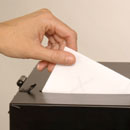Tbilisi won’t look to Russia for election monitors
By Nino Mumladze
Wednesday, December 5

“Russia’s interest in disrupting stability and prosperity in Georgia is very much felt. That’s why, in order not to put our [Russian] colleagues in an awkward situation, we’ve decided not to invite them,” Burjanadze commented.
She added that while invitations had not been sent to the Commonwealth of Independent States (CIS) alliance as a whole, “I have sent invitations to [those] CIS countries who are on friendly terms with Georgia.”
On November 18, the then president, Mikheil Saakashvili, called on the OSCE to send “hundreds and, if necessary, thousands of observers” to monitor the presidential election at a meeting with the chief of the OSCE Mission to Georgia, Terhi Hakala.
The acting president also expressed her regret over Russia’s “unfriendly attitude” towards Georgia, and the failure of the two countries to “normalize relations.”
Russian–Georgian relations deteriorated this week following comments by a senior Russian MP, Boris Gryzlov, that the newly elected Russian parliament could discuss recognizing Georgia’s breakaway regions, Abkhazia and South Ossetia, in January. His comments provoked sharp criticism from Tbilisi.
Meanwhile, international observers have branded the December 2 Russian parliamentary elections, which saw a landslide victory for President Vladimir Putin’s United Russia party, unfair.
“In the light of particularly aggressive statements about Georgia, and considering the malpractice at their own elections in Russia, inviting [Russian] observers to Georgian elections wouldn’t be justified,” Givi Targamadze, Chairman of the Parliamentary Defense and Security Committee, told the television channel Rustavi 2 yesterday.
Kote Gabashvili, head of the Foreign Relations Parliamentary Committee, underlined the importance of the impartiality of election observers, stating, “This cannot be said of the Russian ones.”
However, Gabashvili did not exclude the possibility of certain Russian observers monitoring the polls in the status of representatives of international organizations, the news agency NewsGeorgia reported.
Some opposition figures took a different stance, though, saying Russian observers should be eligible to monitor the elections.
“The more international observers who attend the presidential election—even from unfriendly countries—the greater confirmation of democracy the election will have,” NewsGeorgia quoted Industrialists leader MP Zurab Tkemaladze as saying.